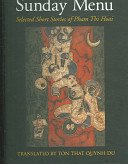home
current issue
featured poet
poem of the week
lives of the poets
poetry near you
reviews
archives
subscribe
donate
about us
contact us
Between Vietnam’s Dreams and Disillusionment
reviewed by Frances Cabahug
 Sunday Menu: Selected Short Stories
Sunday Menu: Selected Short Stories
Pham Thi Hoai
Pandanus Books
“Pham Thi Hoai’s Sunday Menu features the lives of everyday Vietnamese people as they are swept from the past into the modern landscape of the 1990’s, and her stories explore the specific challenges that arise out of the interactions between old and new urbanized spaces. While literary critics have praised Pham’s bold use of language and her perceptive observations of social interactions, her political detractors branded her short stories as an unacceptably pessimistic portrayal of modern Vietnam. As such, Pham’s works are banned in her home country.
The delight in reading Sunday Menu comes from Pham’s refusal to paint a pretty picture of the increasing urbanization of Vietnam with its emphasis on progress and modernity. Instead, the ten stories here read like quotidian documents that mediate the tensions between dreams and disillusionment, community and alienation as the characters try to make sense of their place in world that is still oscillating among the ideologies of nationalistic tradition, communism, and the expansion of Western democratic capitalism. Even though the urban setting draws people in such close proximity, their vast outlooks and ideals set them apart; for instance, in the short story “Saigon Tailor,” the urban narrator’s greatest hope lies in a marriage with her diffident boyfriend, contrasting her lot with the headstrong but naive village girls who are studying to become seamstresses. In “Universal Love,” a mother flippantly entertains her men while a young daughter bears the brunt of maturity and memory. Because of the mixture of generations and ideologies, Sunday Menu is filled with characters who escape convenient categorization.
Pham’s storytelling resists moral judgments, and Pham does not make distinct preferences between one form of government over the other, nor does she champion tradition over modernity or vice versa. Without falling into excessive moralizing or kitschy sentimentality, the stories portray life as it unfolds with the curious specific conflicts that arise from the intersections of cultures and eras. Pham chooses to situate these tensions not in the public sphere of politics, but in the details of normal lives that make up the various classes of Vietnamese society. “Vision Impaired” is a story of the interactions between an intellectual husband and a blind masseur, who is picked up from the street so that the husband can watch the masseur work on his wife’s body. The class differences play out in this sensual tale, culminating in a tragicomic clash between the high-brow intellectualism of the husband and the roguish street smarts of the masseur. A similar juxtaposition can be found in “A Traditional Short Story,” which features a young man who runs into the urban capital to make a name as a poet, contrasted with the simple and easy lives of the friends he leaves behind in the rural township.
Because these short stories do not offer an easy solution or an easy division of good and bad, the censors find it easy to condemn these works as pessimistic. But even though Sunday Menu does not have a particularly cheerful trajectory, the stories are not necessarily as bleak as Pham’s political detractors make them out to be. Although these stories largely deal with conflict and disappointment, the characters’ determinations largely shine through as they negotiate their way through the changes and persist in finding their own space in an evolving landscape. In the short story “Sunday Menu” which the entire collection is named after, those challenges play out even within the trends of Vietnamese cuisine, as the precocious female protagonist in “Sunday Menu” arbitrates between her grandmother’s preference of turn of the century high-class traditional cuisine and her mother’s shabby, but practical food stall. The character points out how she does not belong to either era, and by refusing to be co-opted by both the past’s Eastern patriotic heritage and the modern unromantic commercialism, the girl carves out a space for her own vision by imagining “a cyclo-driver food stall served on a red lacquered tray which would mark the beginning of a new trend in culinary fashion.” The women in the short stories “Toll of the Sea” and “Second Hand” are also finding control over the narratives of their lives. While there is disillusionment when it comes to being rescued, there is a brave acceptance in facing their disappointments, coupled with a renewed energy to singlehandedly fight against their victimization.
With Pham Thi Hoai’s acerbic wit and unflinching honesty, Sunday Menu provides a lucid testament on the challenges of living in an emerging modern Vietnam. Though the stories capture the difficulties of fulfillment under different forms of governments and eras, Sunday Menu affirms the affiliations and interconnections between these ideological differences that continue to shape the changing landscape to this day.
Frances Cabahug lives and writes in Vancouver, Canada.